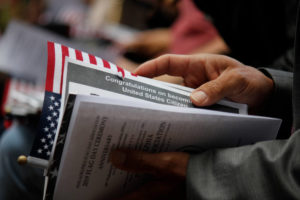Naturalization is the process in immigration law in which a person earns citizenship in a country, and it allows foreign-born people to become full-fledged American citizens and possess most of the same rights as other United States citizens.
Citizenship Attorney in Austin, Texas
Not only will you gain the right of the nationality law to vote, but you also earn priority in sponsoring family members for green cards, may be able to obtain citizenship for children born outside the country, are able to travel with a U.S. passport, and receive full protection from any deportation. When you need help with the naturalization process, make sure you are working with an experienced immigration lawyer in the Austin area.
Requirements for Naturalization
Naturalization is not as simple as just asking to become a citizen. Instead, you are going to need to follow the immigration process to file an application and provide a wide variety of supporting documents in addition to agreeing to an interview and passing a citizenship test.
Title 8 U.S. Code § 1427(a)
Title 8 U.S. Code § 1427(a) establishes that a person cannot be naturalized by immigration law unless they:
resided for a minimum of five continuous years in the United States after being lawfully admitted by immigration law for a permanent residence. Immediately preceding the date of the filing of the application for naturalization and have been physically present there for periods totaling at least half of that time during the five years preceding the filing of their application. In addition to residing within the state or district of the service for a minimum of three months.
- have resided continuously within the United States from the date of the application up to the time of admission to citizenship.
- have been and still are an individual of good moral character who abides by the principles of the Constitution of the United States and is well disposed to the good order and happiness of the United States.
United States Citizenship and Immigration Services (USCIS)
(USCIS) notes that in order for a person to apply for naturalization to become a citizen, they have to:
- Be at least 18 years of age when they file the application for green cards
- According to the immigration law, he/she must be able to read, write, and speak basic English
- Prove an understanding and knowledge of U.S. history and government
- Be willing to take the Oath of Allegiance.
Many foreign-born nationals living in the United States in some legal status often dream of one day passing all requirements to become a U.S. citizens. In fact, being a U.S. citizen is desirable for them for many reasons, one of which is the ability to travel easily and freely. Seek help from an Austin citizenship lawyer.
Eligibility Requirement
If you were born outside the United States and wish to become a U.S. citizen, you must go through what is known as “naturalization,” which is a legal process by which someone like you becomes a U.S. citizen if you meet certain requirements.
In addition, to apply for naturalization to become a U.S. citizen, you must:
- Be at least 18 years old when you file the application.
- Have been a lawful Green Cardholder for the past three or five years, depending on which naturalization category you are applying under.
- Have continuous residence and physical presence in the United States.
- Be able to read, write, and speak basic English.
- Be a person of good moral character.
- Have a knowledge and understanding of basic U.S. government and history.
- Be prepared to show loyalty to the principles of the U.S. Constitution.
- Be willing to take the Oath of Allegiance.
For instance, If you meet these Requirements to Become a U.S. Citizen, you can submit your Form N-400 Application for Naturalization to the United States Citizenship and Immigration Services (USCIS) by paper or online.
Immigration Law Allows to Apply for Naturalization Online or by Paper

To file immigration cases by paper, you should read the instructions for Form N-400. Application for citizenship, complete and sign Form N-400. Pay the filing fee when applicable, and provide all required evidence and supporting documentation.
Ways to Become Permanent Residents for Citizenship
There are essentially three ways that people with an immigrant visa can become permanent residents. In addition to citizenship legal status, you can also obtain a certificate of citizenship or a passport application.
Naturalization is the immigration process of a lawful permanent resident (LPR) becoming a citizen of the United States. The multiple steps involved in naturalization are outlined above.
After an application for immigration status and tests are successfully finished. Wait to receive approval from the immigration law (USCIS). The final step of your immigration case will be you taking the Oath of Allegiance to the United States.
Employment-Based Permanent Residency
Before you can apply for naturalization, you first must be a permanent resident. You can become a lawful permanent resident (LPR) or green card holder, as the status is popularly referred to, through employment if certain requirements are met. The requirements for obtaining an employment-based green card are as follows:
- Job Offer. You must have an offer of employment from an American employer who, in turn, must get permission from the US Department of Labor (DOL) to extend the offer of employment to you. This is done through what is known as “labor certification,” meaning the employer must first demonstrate to the DOL that they cannot find an American worker to do the work and that they will be paying you prevailing wages.
- Petition. Once the employer obtains the labor certification, they will file a petition with the USCIS for you to be given a work visa or green card in this case.
- Application. Either concurrently or after the employer’s petition is approved, you will need to file an application for the green card based on the approved petition. Depending on where you reside and your status, you can either apply with USCIS or at a US consulate if you are outside the United States.
Family-Based Permanent Residency
You can become a green card holder through family if you meet the following criteria:
- Family Member Sponsor. Under US immigration law, US citizens and green card holders can petition the USCIS and have their relatives be given green cards. However, not all relatives qualify to get green cards as the law confines these to mostly spouses, children, siblings, and parents of the US citizen. Even among these relatives, how their cases are processed and especially how long it takes depends on whether the sponsoring relative is a US citizen or green card holder, age, and other factors.
- Petition. The US citizen or green card holder will need to file a petition with USCIS to have you get approved for the green card. There are requirements this petition must satisfy, including proving the bona fides of the relationship. This is primarily done by documentary evidence, but you may also be required to attend an interview in which the examining officer will determine if the relationship is as claimed in the documentation.
- Application. Either concurrently or after the petition by your relative is filed, you will file an application for the green card based on the approved petition. The application should be approved unless you are found to be “inadmissible,” which is a legal barrier for someone to be approved for a green card unless a waiver of this barrier is obtained.
Besides these two primary avenues of becoming a US permanent resident, there are other lesser commonly utilized avenues such as self-petitioning, diversity visa lottery, and investing significantly in the United States.
Becoming a United States Citizen
One becomes a United States citizen either by birth or through naturalization.
Naturalization is the immigration process of a green card holder becoming a citizen of the United States. The multiple steps involved in naturalization are outlined above.
The process begins with your filing an N-400 Application for Naturalization with USCIS. The application must be accompanied by all the necessary documents to show that you meet the criteria for approval as well as with the correct filing fee.
Naturalization process:
- Biometrics. Your fingerprints will be taken at your local USCIS office. Fingerprints are taken to conduct background checks, and this is usually done about 1 month after you have submitted your application.
- Citizenship Interview and Exam. You will be sent a letter to go to your local USCIS office for an interview. This interview is to verify information on your application for citizenship and will also be an occasion for the immigration officer to test your basic English and Civics knowledge. The USCIS website provides resources to practice for your English skills and your Civics test so take advantage of that if you haven’t already.
- Oath of Allegiance. Once your application for citizenship is approved, you will be invited to attend an Oath of Allegiance ceremony. You must attend this ceremony because you are not and cannot become a US citizen unless you have taken the oath.
Common Reasons Why Citizenship is Denied
Many people are surprised to find out they are either ineligible to apply for citizenship or, if they are eligible, they are denied citizenship often for reasons they could have avoided had they known. If you are contemplating applying for citizenship, you may wish to familiarize yourself with some of these reasons:
- Criminal Record. All applicants for citizenship must undergo a background check, and if one has a criminal record, this will be examined by USCIS to determine whether the convictions are a bar to citizenship. While not all convictions can result in denial of citizenship, more serious ones such as murder or aggravated felonies often do.
- Failure to Provide Child Support. If you have a court order to pay child support and you have not complied with that order, chances are your application for citizenship will be denied. It is important to make sure you are in compliance with the order before submitting your application for citizenship.
-
- Failing to Pay Taxes. Your application for citizenship cannot be approved if you owe outstanding federal taxes. It is not necessary that you have your outstanding taxes paid in full before you can be approved for citizenship. Rather, you must show that you are meeting your payment obligations, such as having a payment plan with the IRS that you are following.
- Fraudulent Citizenship Application. Providing false information or fraudulent documents will result in your application for citizenship being denied.
- Failing Physical Presence Requirements. One applying for citizenship is generally required to have been physically present in the United States for at least half the time for which his or her continuous residence is required. If you traveled outside the country a lot, make sure you compute the math right to make sure this requirement is met before submitting your application.
Other Common Reasons Why Citizenship is Denied
Not everyone who passes the prerequisite to becoming a U.S. citizen is approved. There are many reasons why an application for naturalization may be denied, but the most common reasons include the following:
- Not passing the English and Civics Naturalization Test
- Failure to satisfy the Good Moral Character requirement
- Failure to satisfy the Physical Presence requirement
- Owing to the IRS money and not having any arrangements to pay the money
- A finding of fraud in the application or supporting documents
What is a Certificate of Citizenship?
A certificate of citizenship is a document proving the U.S. citizenship of a person who was born outside the country. Just to clarify, the person was born to United States citizen parents. It does not on its own grant citizenship, but instead recognizes and confirms citizenship status already obtained by an applicant.
You are eligible to apply for a certificate of citizenship if you were born abroad to a U.S. citizen parent.
If you automatically obtained citizenship after being born but before turning 18 years of age. When you became a citizen after birth but before the age of 18, you will have to satisfy four basic requirements before your 18th birthday:
- A child needs to live in the United States under the legal custody of a U.S. citizen parent
- A child has to be the biological offspring of their parent(s)
- A child must be an LPR
- A child’s parent(s) must be U.S. citizens
Seek legal assistance in immigration legal services with a qualified immigration attorney at J Spark Law, PLLC. Our Austin immigration attorneys have legal specialization in immigration-related matters.
How to Apply for a Certificate of Citizenship?
Applying for a certificate of citizenship will require you to submit a Form N-600 (Application for Certificate of Citizenship). As well as the petitioner and U.S. parents’ birth certificate, two passport-style photos, and some proof of one parent’s citizenship. USCIS describes a certificate of citizenship eligibility as either acquisition. Which refers to children who are born outside the U.S. to parents with U.S. citizenship, or derivations. Which refers to children of parents who are LPRs or green card holders and obtained U.S. citizenship.
If you were born outside the country and your parents failed to register your birth at the U.S. Embassy or consulate. You can still apply for a U.S. passport. You will need a foreign birth record that shows both of your parents’ names. Also, you need evidence of your parent(s) U.S. citizenship, and your parents’ marriage certificate.
An Austin immigration attorney from our law firm can help you to get a certificate of citizenship through all procedures of immigration law.
Immigration Attorney Helps With Your Passport Application
The passport application is known as a DS-11, and it states that applying for a U.S. passport involves completing the application, attaching one color photograph 2×2 inches in size, as well as supporting documents that can differ depending on whether you were born inside or outside the United States, scheduling an appointment to apply in person, and then arriving for the appointment to present all of your immigration papers before tracking the application status and then receiving the passport.
Applicants born in the United States will have to submit an original or certified copy and a photocopy of the front and back (when there is printed information on the back) of a U.S. Birth Certificate that was issued by the city, county, or state of birth, lists your full name, birth date, birthplace, parent(s)’ full names, the date filed with the registrar’s office (must be within one year of birth), and shows the registrar’s signature and the seal of the issuing authority; a fully valid, undamaged U.S. passport that can be expired; a Consular Report of Birth Abroad or Certification of Birth Abroad; or a Certificate of Citizenship. Secondary documents can be required in some cases.
Passport Application for Born Outside the United State

Immigrants claiming permanent residency through birth abroad to at least one U.S. citizen parent submit their Consular Report of Birth Abroad (Form FS-240), Certification of Birth (Form DS-1350 or FS-545), or their foreign birth certificate (and official translation if the document is not in English), their parent’s proof of U.S. citizenship, their parents’ marriage certificate, and an affidavit showing all their U.S. citizen parents’ periods and places of residence and physical presence before their birth. Applicants claiming citizenship through adoption by a U.S. citizen submit their permanent residence status, their full and final adoption, proof they were in the legal and physical custody of their U.S. citizen parent(s), and proof they have resided in the United States.
Tips for Passing The Civic Test to Get U.S. Citizenship
-
Do Not Overestimate Your Ability
Many people make the mistake of assuming a citizenship test is an easy exam they can wing and pass with little or no preparation. That is just not the case. To take and pass the naturalization exam, one must take time and prepare. The USCIS website has some resources to practice your English skills and your civics test. You can either print these questions and practice them at every opportunity you have free time, or you can download the questions and practice them when free or in between tasks. Get your family or friends involved, if possible, by having them ask you the questions.
-
Organize Your Study
The civics test has questions that are divided into five subjects: government, history, geography, holidays, and symbols. You should think of each of them as a separate subject matter. This will make it easier for you to remember during the test as your brain will take a cue and organize the knowledge in different “boxes” for easy retrieval during the actual exam.
-
Speak and Write English Frequently
It is natural to hang out with those who speak your language. You also might tend to speak your native language at home, but both habits and practices make it harder to learn to speak English enough to pass the test. Try to speak English as much as possible leading up to the exam. You can also take classes, watch TV, read online articles, and do your best to communicate with others in English. The more you do this, the higher your chances of passing the naturalization process with the citizenship test.
Speak with an Austin Immigration Lawyers
If you are trying to become an American citizen, do not try to navigate the process on your own. The immigration lawyers at J. Sparks Law, PLLC have represented immigrants all over Texas for more than two decades in immigration matters, Our law offices with our best texas board certified immigration attorney can review your case when you call (512) 952-2176 or contact us online for immigration law services or for a free consultation.

 resided for a minimum of five continuous years in the United States after being lawfully admitted by immigration law for a permanent residence. Immediately preceding the date of the filing of the application for naturalization and have been physically present there for periods totaling at least half of that time during the five years preceding the filing of their application. In addition to residing within the state or district of the service for a minimum of three months.
resided for a minimum of five continuous years in the United States after being lawfully admitted by immigration law for a permanent residence. Immediately preceding the date of the filing of the application for naturalization and have been physically present there for periods totaling at least half of that time during the five years preceding the filing of their application. In addition to residing within the state or district of the service for a minimum of three months.










